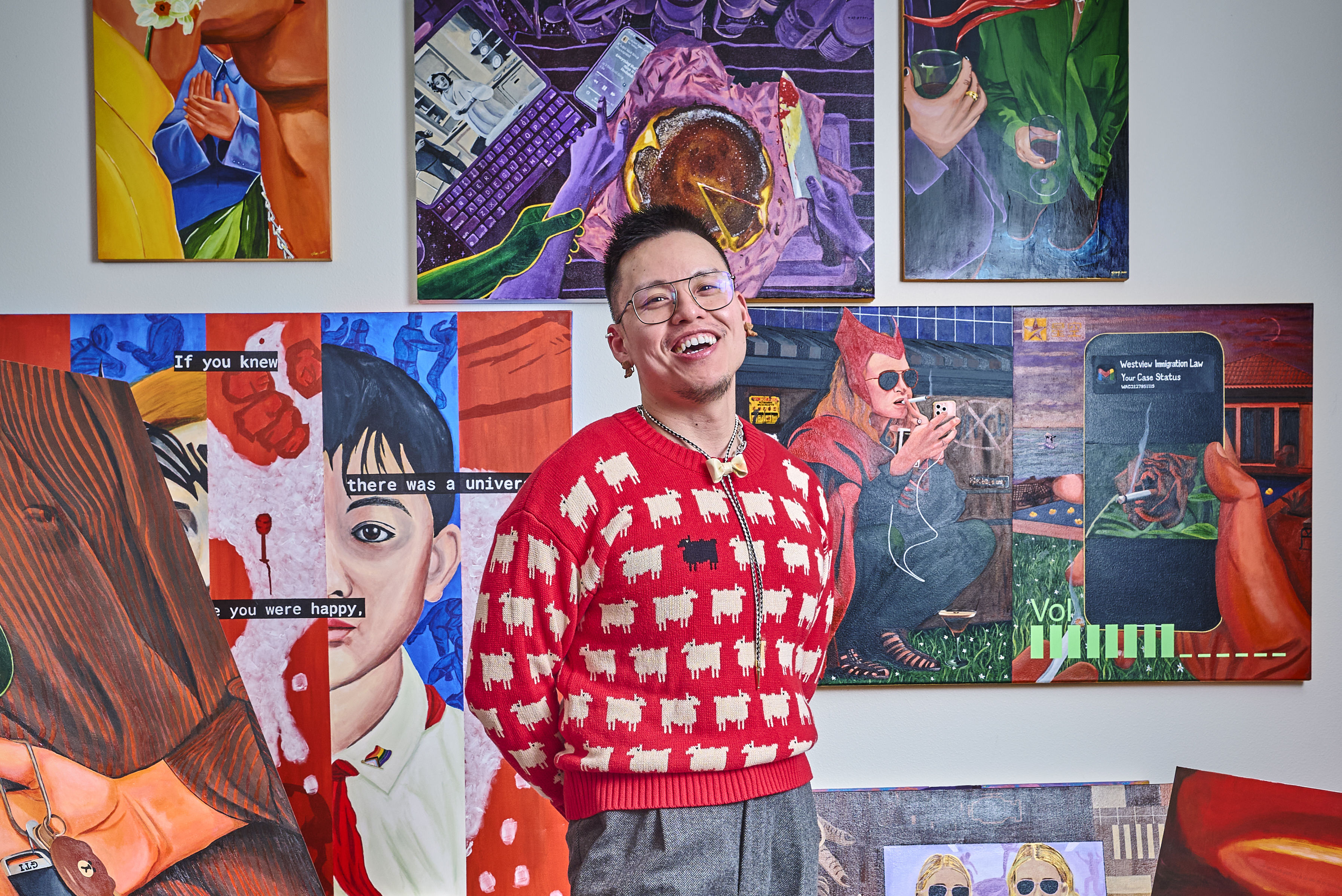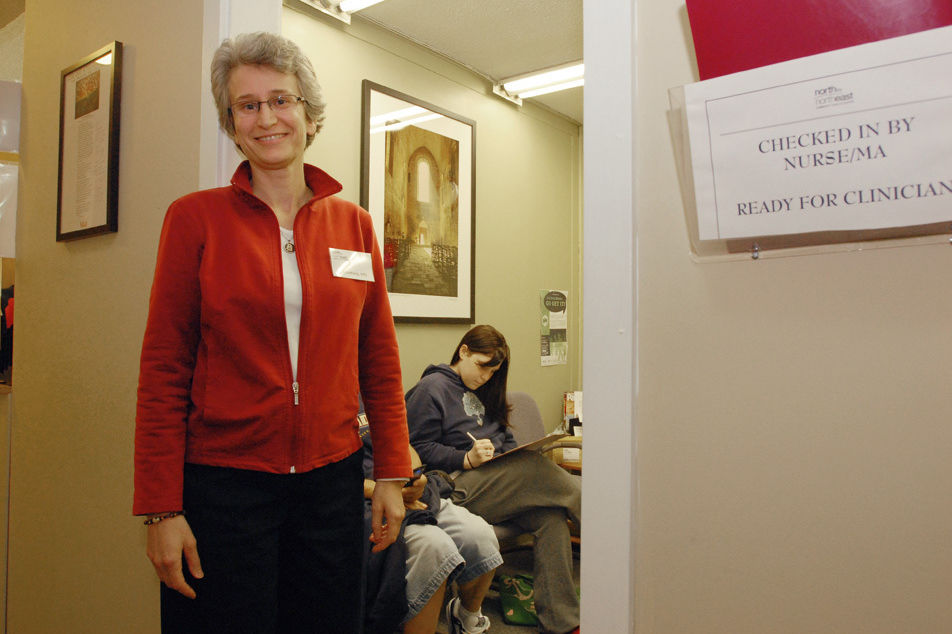
Light A Fire 2007
THREE AUTUMNS AGO, Portland Monthly partnered with the Oregon Community Foundation and created the Light A Fire Awards to celebrate the achievements of the metropolitan area’s lesser-known charities, as well as the volunteers and benefactors who support them. Each year, the selection process begins with an online ballot, where executive directors from local nonprofits and Portland Monthly subscribers nominate individuals and organizations in 13 award categories, explaining in 250 words or less why nominees deserve recognition. Our selection committee then reads through the ballots (347 this year) and chooses winners based not on the number of votes each nominee receives, but on the impact they’ve had in our community. Now that the October 30 gala has passed, we reintroduce our Light A Fire winners here, in the hope that their stories will spark another round of giving we can celebrate in these pages next year.
KEEPING US HEALTHY
North by Northeast Community Health Center
THE NORTH by Northeast Community Health Center officially opens at 6 p.m., but by 6:30, every seat in the clinic’s waiting room is taken. That’s partly because demand for the clinic’s services is so great—and partly because the reception area is so tiny, 10 feet by 12 feet at most. In fact, just eight second-hand chairs fit into the space, but one man, who hopes the doctors can cure the infection ravaging his cracked and cut hands, has been waiting just outside since 3 p.m. to ensure he gets a seat. A few feet away, nine volunteers crammed into the intake office consult charts and make phone calls. On the clinic’s front porch, nurse practitioner Ward Mann gestures emphatically, stethoscope swinging from his neck, to a patient.
“I just don’t know what we’ll do this winter,” says Dr. Jill Ginsberg, the clinic’s cofounder and a part-time family practitioner at Kaiser Permanente in Vancouver. “During the summer, it’s fine for patients to be waiting outside, but we can’t have them waiting in the rain.”
This wasn’t a concern in 2006, the year the free medical clinic on N Williams Ave—which is open for walk-ins on Thursday nights and by appointment on some Monday evenings—started with just two exam rooms and five doctors. The night they hung out their sign, just four patients showed up. But in a state where almost 17 percent of the population has no health insurance (nationwide, only 13 states have higher rates of uninsured residents), word about free health care travels fast. Over the last year, the clinic, which provides free consultations, prescriptions and lab tests to the uninsured, has seen its patient roster grow to more than 500. Every Thursday up to 20 people show up hoping to see a doctor.
The lack of space isn’t something Ginsberg can worry about tonight, though. She has eight patients in need of treatment, prescriptions to hand out and a new office manager to train. “It’s like Pastor Mary says,” Ginsberg quips. “‘You just have to do the next thing. You don’t have to see what’s at the end of the road, just what’s in front of your foot.’”
Pastor Mary is 70-year-old Mary Overstreet-Smith, pastor of North Portland’s Powerhouse Temple Church of God in Christ, who cofounded the clinic with Ginsberg. Overstreet-Smith, who hails from Gulfport, Miss., made local headlines in 2005 when she underwrote the evacuation of Hurricane Katrina refugees at a time when many people were bemoaning the ineptitude of the federal government’s relief effort.
“We have to do more than say something,” Overstreet-Smith remarks. “Most of the time we’re waiting on someone else, like the president, to do something. He moved too slow for me, so I sold my house and brought 31 families to Portland.”
The day the levees broke, Overstreet-Smith wired money she had in savings to her daughter, who had escaped from Gulfport to Tennessee, with instructions to rent a van and collect as many survivors as she could. When all was said and done, more than 100 Katrina refugees found themselves on airplanes or Greyhound buses headed for Portland, where Overstreet-Smith had already found apartments for them and paid three months’ worth of rent (using the proceeds from the sale of her home). But when Overstreet-Smith took the families to what was once a free medical clinic on NE Alberta St, she discovered it had closed down.
“I had to take them to a crowded ER,” says Overstreet-Smith. “And while I was sitting there I thought, ‘These people need care. I should open my own clinic.’” All she needed was a doctor.
ENTER GINSBERG. Inspired by Overstreet-Smith’s decisive action in the face of such massive catastrophe, Ginsberg had collected cash and clothing donations from her Dolph Park neighborhood and made an appointment to bring them to Overstreet-Smith on Nov 10, 2005. When Ginsberg dropped off the donation, Overstreet-Smith engaged her in a conversation about a free medical clinic to serve the needs of poor North Portland residents. Ginsberg agreed it was a good idea.
“She said, ‘Let me know when you get things together,’” remembers Overstreet-Smith. “I said, ‘I’m letting you know now.’” Two minutes later, Ginsberg was driving down N Skidmore St when she got a call on her cell phone.
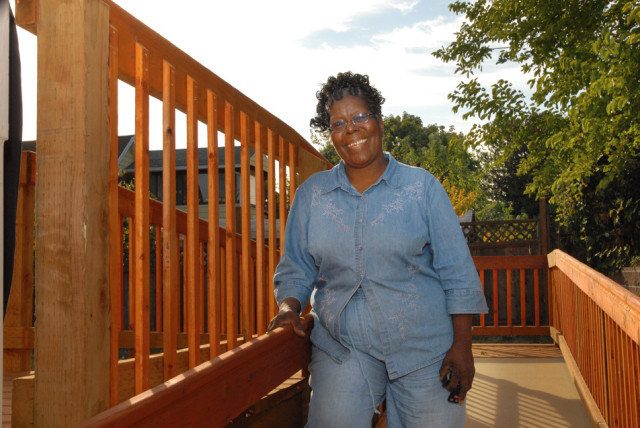
Image: Misha Ashton
“I got the key to a place where I think we can house the clinic. Why don’t you come take a look?” Overstreet-Smith asked.
In those few intervening minutes, Overstreet-Smith had called her brother, with whom she co-owned a home that was on the market just blocks from the church. She instructed him to take down the For Sale sign in the front yard. “I found a doctor!” she told him.
When Ginsberg stepped inside 4725 N Williams Ave, she gaped at the glass display cases, tables, chairs and coffeepot. Overstreet’s “clinic” was a former bakery, and it still smelled vaguely of cookies.
“So,” said Overstreet-Smith to a slack-jawed Ginsberg. “When can you get started?”
Today the clinic still smells of baked goods, but that’s owing to a tin of coconut cookies brought in for tonight’s volunteers. North by Northeast’s stable of volunteers numbers more than 50 and includes about a dozen doctors and nurse practitioners. Many of them work at Kaiser, which donated the chairs, tables and exam-room equipment from its warehouse; the company’s Northwest Permanente group also agreed to extend malpractice insurance to Kaiser physicians working here. Other medical supplies come from Medical Teams International, a Tigard-based Christian relief agency; the prescriptions North by Northeast doles out for free are paid for by a partnership between Providence Health System and Portland’s Coalition of Community Health Clinics; Legacy Health System donates the lab work. The clinic’s operating costs, including the salary of recently hired office manager Suzy Jeffreys, are covered by individual donations and a variety of patched-together local grants, like one from Northwest Health Foundation, while Oregon nonprofit Technical Assistance for Community Services provides day-to-day operational support.
Portland’s need for a clinic like North by Northeast is symptomatic of the health care crisis that extends beyond Oregon’s borders. According to a recent U.S. Census Bureau report, 47 million American—or roughly 16 percent of the population—went without health insurance for the whole of 2006, up from about 39 million in 2000. Hispanic and African-American populations are the hardest hit, with uninsured rates of 34 percent and 21 percent, respectively.
The situation in Oregon is even more dismal. A report released by Families USA, a nonprofit that advocates for affordable health care, estimates that 35 percent of Oregonians under the age of 65 went without health insurance at some point in the last year, a 7 percent jump since 2000. A lack of funding for the Oregon Health Plan, the state and federal health care safety net that was designed to provide minimal coverage to very low-income families, is partly to blame: The State Legislature made cuts to the program’s standard benefit package in 2003—and the plan dropped more than 80,000 Oregonians from its rolls. In spite of the state’s growing population, the plan hasn’t accepted new enrollees since 2004.
“My heart is broken because of the stories we hear,” says Ginsberg. Stories like that of Betty Parks. In 2000 the 58-year-old St-Johns resident lost her job and her insurance. Too young for Medicare and ineligible for the Oregon Health Plan, Parks, who suffers from a very manageable, but potentially deadly, problem—high blood pressure—had nowhere to turn. For almost six years, she carried around her empty blood-pressure medication bottle, wanting desperately to refill the prescription, but unable to afford the cost of a doctor visit.
UNTIL HER COUSIN told her about North by Northeast last year, Parks would simply wait until she felt light-headed, dizzy, with tightness in her chest—symptoms of her skyrocketing blood pressure—then she would check herself into the emergency room. In the year since she started visiting the clinic, however, she hasn’t made a single trip to the ER.
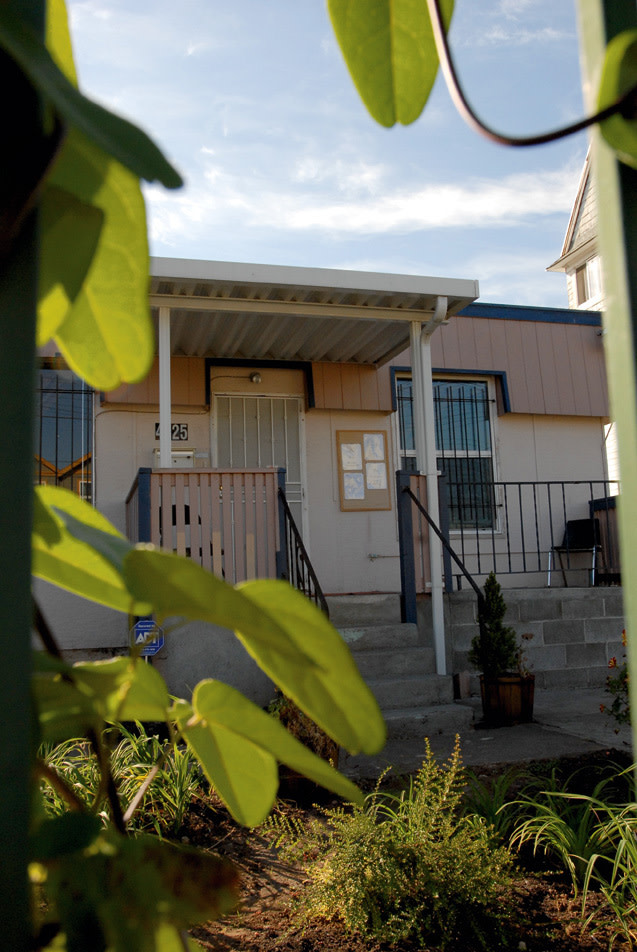
Image: Misha Ashton
“I get more from the doctors at the clinic than I did from the docs I had when I had insurance,” Parks says, eyes crinkling at the corners as she smiles while waiting to see one of the clinic’s doctors. “They really talk to me and explain things so I can understand them. It feels good knowing what’s going on with my body, empowering.”
Parks’s story, and the hundreds like it, frustrate Ginsberg, in large part because the chronic conditions most of the clinic’s patients come in for—high blood-pressure, diabetes and asthma—are so easy and inexpensive to treat. With preventive medicine, patients like Parks should never reach the life-threatening stage that requires a visit to the hospital. Parks receives her medication free from the clinic, but if she had to pay for it, a month’s supply of the generic blood pressure medication would cost only $6; the doctor visit required to get that prescription, however, costs about $125. A trip to the ER can cost upward of $300.
Because the staff of North by Northeast know they can’t help everyone, the clinic limits its mission to helping a specific neighborhood, defined by the five ZIP codes that cover North and inner Northeast Portland. Still, patients come from as far away as Scappoose looking for help. “We’ll never tell people, ‘You don’t belong here,’” says Ginsberg. While patients from within the service area get priority on Thursday nights, if the doctors have time, they’ll see others or help them find a clinic closer to home.
The Portland metro region currently has eight free or reduced-cost clinics and five that operate on a sliding scale. For example, Southwest Community Health Center, in the Multnomah neighborhood, offers care for free or a small donation, as does Wallace Medical Concern in Gresham. Others, like downtown’s Outside In Medical Clinic, offer treatment on a sliding scale. When North by Northeast patients have a condition that requires treatment by a specialist, like someone with a potentially cancerous skin lesion who needs to see a dermatologist, volunteer social workers tap into Project Access Multnomah County, an effort supported by the Coalition of Community Health Clinics to connect patients to doctors who have agreed to donate their time and skills for free. Most of the patients North by Northeast has treated to date have used—or tried to use—at least one other low-cost clinic.
“When people need help, they can be incredibly determined about getting it,” says Ginsberg.
And when they find it, they are incredibly grateful: When the center’s volunteer coordinator, Chloe Busch, locked her keys in her car, a patient who’d stopped by to pick up a prescription drove her home to get a spare key and then drove her back to the clinic. “It was a small thing for him, but he was so excited to be able to do something,” says Ginsberg.
It’s a sentiment the doctor can relate to. In the face of our country’s massive health care dilemma, it’s easy for the very people who have sworn an oath to help to feel most helpless. But by focusing on one neighborhood and one clinic, Ginsberg and Overstreet-Smith know they are taking a step forward. Ginsberg mentions a Jewish teaching that instructs, “Although you do not have to finish the task, neither are you free to desist from it.” And the staff of the North by Northeast clinic are prepared for a very long walk.
WHAT THEY NEED: Stamps, office supplies and cash donations; volunteer nurse practitioners.
TO GIVE: www.nxneclinic.org; 503-287-4932
Most Extraordinary Board Member Over 35
Gary Maffei
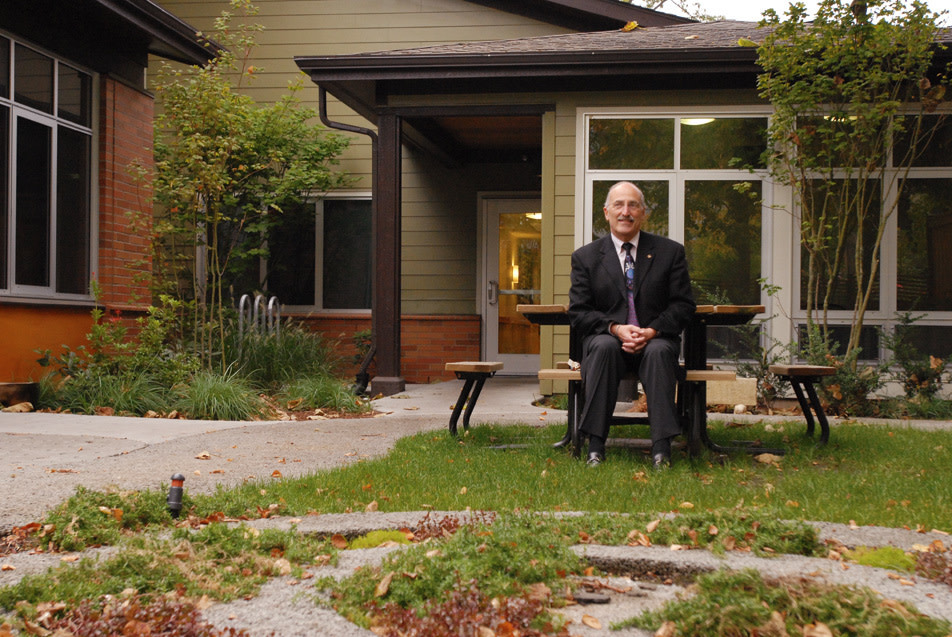
Image: Misha Ashton
WHY HE’S EXTRAORDINARY: Gary Maffei began his 15-year stint on the board of Our House, an organization that supports people living with HIV/AIDS, after losing a good friend to the disease. In 2005-6, Maffei led Our House’s Circle of Life capital campaign, raising $5.5 million to fund the reconstruction of an outdated and ill-equipped residential facility on SE Alder St, expanding it by 6,000 square feet (it now accommodates 14 patients, up from 10, with office space on a separate floor). Sally Dadmun Bixby, Our House’s development director, says Maffei has “opened doors for us” through his enthusiasm for fundraising and the personal connections he’s cultivated with private philanthropists. “People are drawn to him,” Dadmun Bixby says. “The man lights up when he starts talking about the charities he loves.” —EG
WHAT THEY NEED: Cash donations
TO GIVE: www.ourhouseofportland.org; 503-234-0175
Purely for the Love
Returning Veterans Resource Project NW
WHAT THEY DO: In the summer of 2004, Portland therapist Carol Levine knew she had to do something after reading that veterans returning from Iraq and Afghanistan weren’t getting the help they needed to deal with post-traumatic stress disorder and other war-related psychological conditions. She vowed to donate her services, free of charge, to a single veteran for however long it took the patient to recover. Then she started making calls to colleagues asking if they would do the same, and within three days she had 25 psychotherapists signed up to donate one hour a week of strictly confidential pro bono counseling to veterans and their families. Today, the Returning Veterans Resource Project has 46 therapists enrolled: They currently treat 34 veterans and their family members. “We were warned by the Veterans Administration that it would take a while to get patients,” Levine says. “But we’re in it for the long haul.” —EG
WHAT THEY NEED: Cash donations and therapists willing to donate time
TO GIVE: www.returningveterans.com; 503-402-1717
Most Extraordinary Board Member Under 35
Fay Schuler
WHY SHE’S EXTRAORDINARY: Fay Schuler, herself a survivor of domestic violence, brought more than 10 years’ experience as a victims’ advocate when she began volunteering in 2005 with the Portland Women’s Crisis Line, a 24-hour statewide hotline for survivors of domestic and sexual violence. As board president, 32-year-old Schuler was instrumental in hiring a new executive director, developing a three-year strategic plan (which includes a new ad campaign to promote the crisis line) and spearheading the organization’s most successful fundraiser to date, a September gala at the Wonder Ballroom that netted $32,000 to purchase bus and billboard ads. “It’s all about getting the phones ringing,” she says. —EG
WHAT THEY NEED: Cash donations and therapists willing to donate time
TO GIVE: www.pwcl.org; 503-232-9751
Inspiring the Next Generation
Northwest Children’s Theater and School
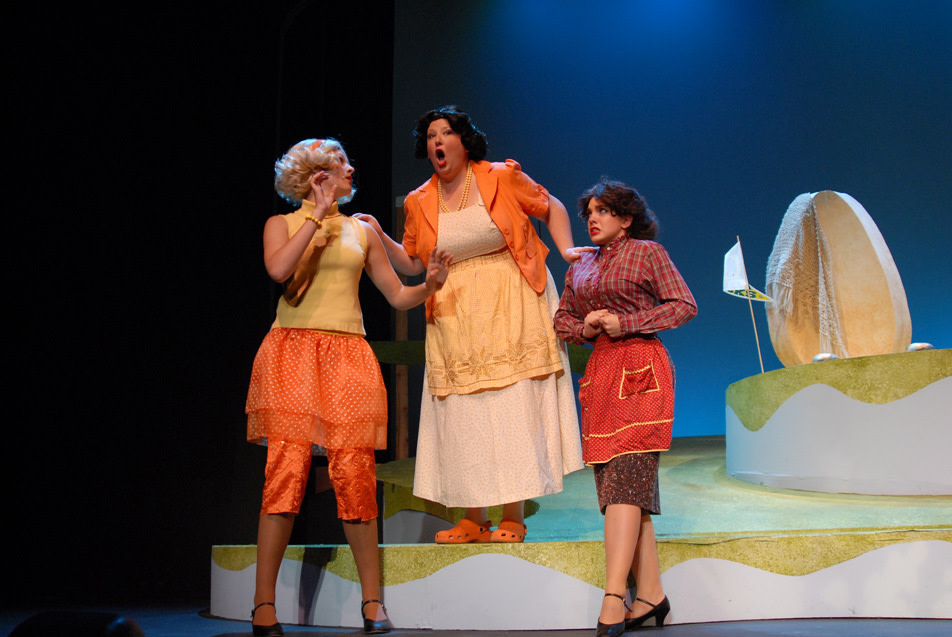
Image: Misha Ashton
WHAT THEY DO: On a typical Saturday, singing voices, soft-shoed dance steps and the sounds of a piano float through the halls of the Northwest Children’s Theater and School in Northwest Portland. In addition to staging 90 public performances a year in a 450-seat auditorium, the organization operates the largest theater school in Oregon, offering year-round acting classes (from “Playlabs” for novices that culminate with a full-scale production, to private coaching for those contemplating stage careers).
The nonprofit also runs an outreach program for at-risk kids, while its touring company seasonally stages shows at Portland-area public schools. “It’s an incredible opportunity for kids to work with pros,” says parent Nancy Kurkinen. “They get to be on that big stage, which is a thrill in itself.” —EG
What they need: Volunteer ushers; cash donations to keep class fees low
TO GIVE: www.nwcts.org; 503-222-4480
Honoring Our Elders
Elders in Action
WHAT THEY DO: Elders in Action helps seniors in Multnomah, Clackamas and Washington Counties meet their housing, health care and transportation needs. It also assists seniors who have been victimized by identity theft or fraud; last year, Elders in Action advocates recovered more than $276,500 for 1,566 elderly crime victims. Noting that most volunteers are in their 60s and 70s, executive director Vicki Hersen describes the mission of her organization as “engaging the wisdom of older adults for the betterment of the community.” —EG
WHAT THEY NEED: Cash donations and volunteer advocates
TO GIVE: www.eldersinaction.org; 503-235-5474
The Most With the Least
Care to Share
WHAT THEY DO: Beaverton-based Care to Share serves primarily as a nerve center for 21 church-based food banks; its staff of three coordinates food deliveries and appointments for pantry visits, steering families to church food banks that can fulfill their needs. In 2006, Care to Share helped 38,111 people find the assistance they needed, be it emergency food (worth $762,975) or rent and utility payments (worth $71,941). —EG
WHAT THEY NEED: Volunteers to answer phones; cash donations
TO GIVE: www.caretosharehelp.org; 503-591-9025
Most Extraordinary Executive Director
David Fuks, Cedar Sinai Park
WHY HE’S EXTRAORDINARY: As the chief executive of Cedar Sinai Park, a Southwest Portland retirement community that provides a host of other related services for the area’s elderly, David Fuks leads one of the largest institutions in the Portland Jewish community. Not long after Fuks (a professor in the graduate school of social work at Portland State University) took the job 10 years ago, Cedar Sinai Park recast itself as a teaching organization, collaborating with Portland Community College to create a training curriculum to improve practices in the field of elder care. Fuks still teaches at PSU, grooming the next generation of social workers while providing Cedar Sinai Park with a steady stream of interns. Anticipating an influx of retirees, he’s established a capital campaign to remodel Cedar Sinai’s infirmiry, and he hopes to purchase an apartment building downtown to provide affordable housing for low-income seniors. —EG
WHAT THEY NEED: Cash donations and volunteers to lead social activities
TO GIVE: www.cedarsinaipark.org; 503-535-4303
Most Extraordinary Pro Bono Contribution
Bill Dickey
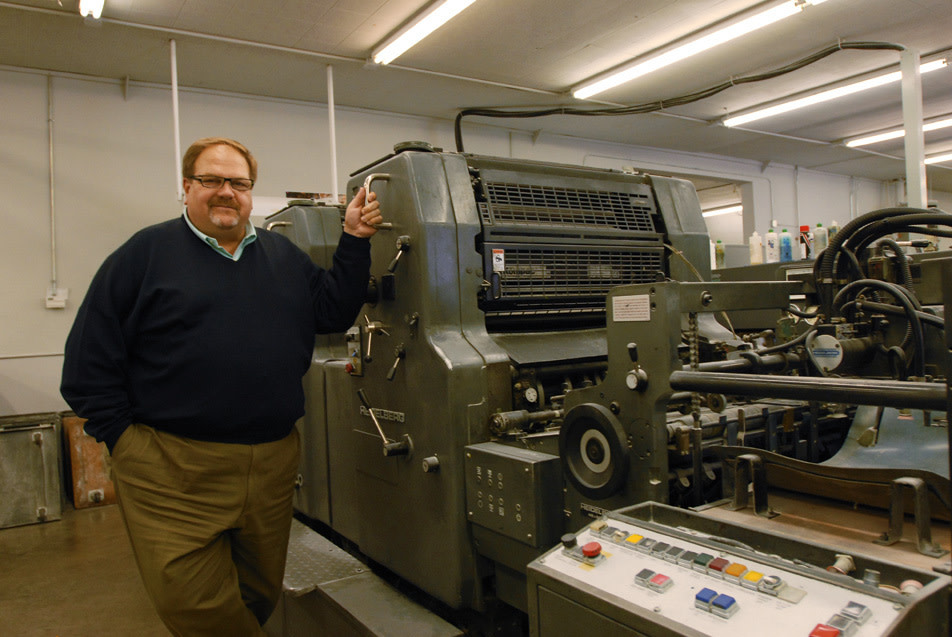
Image: Misha Ashton
WHY HE’S EXTRAORDINARY: Bill Dickey is hooked on giving. “It becomes a kind of habit,” he says. His Northeast Portland-based printing company, Witham and Dickey Inc., has made a habit of taking on pro bono and discounted jobs for nonprofits all over the metro area, from Sherwood’s Cat Adoption Team to Portland Center Stage to Basic Rights Oregon, gifts worth thousands of dollars. Dickey has also donated cash to the Oregon Humane Society, Special Olympics Oregon, the Equity Foundation, the ALS Association of Oregon & SW Washington—so many organizations that he forgets all their names. Smaller nonprofits like the Portland Lesbian & Gay Film Festival also rely on Dickey’s generosity—artistic director Gabriel Mendoza says the impact on his festival is “almost immeasurable.” But Dickey doesn’t mind that he’s been pegged as a giver by so many charities and is constantly swamped with nonprofit orders that add nothing to his bottom line. “My business partner lets me go willy-nilly on it,” he says. “I keep telling him that this comes back to us—people want to support the good work.” —EG
CONTACT: www.withamanddickey.com; 503-736-0930
Building Community
Hands On Greater Portland
WHAT THEY DO: Hands On Greater Portland was founded in 1996 by a circle of busy friends who wanted to make it easier for professionals to volunteer their limited time. The organization maintains an online project calendar, listing hundreds of volunteer opportunities with nonprofit groups across the metro area. Projects are tagged according to type, such as environment, health and homelessness, as well as length of commitment and location, allowing volunteers to find just the opportunity they are looking for. According to executive director Andy Nelson, 96 percent of last year’s participants said they’d sign up again. “It’s important to us that volunteers feel like the experience was worth it and want to do it again,” says Nelson. “We’re trying to launch people into volunteering for good.” —EG
WHAT THEY NEED: Volunteers to help a variety of charities in need
TO GIVE: www.handsonportland.org; 503-413-7787
Most Extraordinary Volunteer
Mary Fromwiller
WHY SHE’S EXTRAORDINARY: Tom Soma, executive director of the Ronald McDonald House Charities of Oregon & SW Washington, sums up his feelings about volunteer Mary Fromwiller this way: “I just call her ‘Mom.’” He’s not the only one: Fromwiller has 6 children—not to mention 20 grandchildren and 11 great-grandchildren. No stranger to volunteering, Fromwiller was a district coordinator for United Good Neighbors (which raised money for children with birth defects) in the 1960s, served as a phys ed instructor at St Joseph the Worker in Southeast Portland, delivered Meals on Wheels, and still provides communion to homebound members of St Joseph, every Wednesday. When Ronald McDonald House needs to send out a mailing, whether it’s a few hundred or a few thousand pieces, 81-year-old Fromwiller throws herself into the task. Gathering a chatty group of church ladies in the kitchen, she gets to work, folding, stuffing and stamping. Says Soma: “She brings a constant smile, a warm heart, a fun-loving attitude and a group of good friends to every assignment.” —EG
WHAT THEY NEED: Cash donations; donations of household items and new toys; volunteers to cook for visiting families
TO GIVE: www.rmhcoregon.org; 971-230-6700 (East Portland) or 503-494-5200 (West Portland)
HAVING FUN
SHIFT
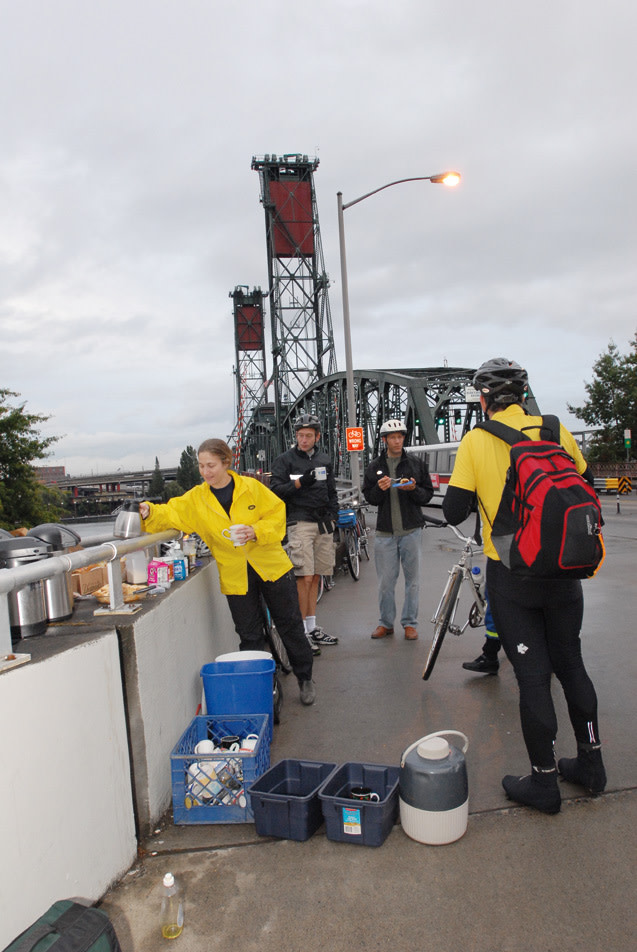
Image: Misha Ashton
WHAT THEY DO: Shift, a loosely knit group of two-wheeled transportation enthusiasts linked by an e-mail list, takes a lighthearted approach to coaxing commuters out of their cars and onto bikes. That attitude shines through in Pedalpalooza, a 17-day, bike-oriented citywide festival this summer that included 140 events (from the Pedal Potluck Picnic to the Biking Viking ride), and Breakfast on the Bridges, a last-Friday tradition wherein Shift volunteers dole out free coffee and doughnuts to bike commuters cycling over the Hawthorne and Broadway Bridges. Then there’s Move by Bike, a Shift program that dispatches a convoy of pedal-powered moving vans (volunteers equipped with heavy-duty bike trailers). Think of it as We-Haul instead of U-Haul, a community effort that transforms the prospect of changing addresses from a dreaded chore into a celebratory parade. As Shift spokesperson Jonathan Maus puts it, “It’s all about bike fun.” —EG
WHAT THEY NEED: You, on two wheels.
TO GIVE: www.shifttobikes.org; 503-542-6900
Most Extraordinary Donor
Al Jubitz
WHY HE’S EXTRAORDINARY: Lauren Tietsort, development manager of Morrison Child and Family Services, calls Al Jubitz a “quiet champion” of the organization, which provides mental health, substance abuse and other services to more than 5,000 children and their families each year. Besides supporting the organization himself, Tietsort says, Jubitz “does a lot of work to make sure we’re connected with people who might feel the call to donate.” According to Morrison chief executive Tia Gray Stecher, Jubitz’s substantial financial contributions have “literally saved various programs as well as the organization as a whole.” When it comes to getting credit for his help, though, Jubitz wants to give that away too—to his wife, Nancy. “She did the heavy lifting, with three kids of our own and two foster daughters,” he says. “I get the recognition, because I’m the one who had the time to sit on boards. I wish this award were going to her.” —EG
WHAT THEY NEED: Art supplies, sports and outdoors equipment; volunteer mentors
TO GIVE: www.morrisonkids.org; 503-258-4200
Best-Kept Secret
Financial Beginnings
WHAT THEY DO: Melody Thompson and Kari McClellan founded Financial Beginnings in 2005 with the aim of educating Oregon middle, high school and college students about personal finance. The inspiration for Financial Beginnings came, ironically, at the collections agencies in Portland where they both worked before founding their nonprofit. McClellan explains, “We got to see it go wrong when young people didn’t understand finance rates and credit.” Together, the pair tours Portland-area public schools, offering a free class in “financial literacy” that teaches students how to balance a checkbook, read a credit report and calculate compound interest. McClellan recalls one demonstration of the ruin that can result when a person makes just the minimum payment on a high-interest credit card. She knew the message was getting through when a hand went up and the student asked: “Why would anyone do that?” —EG
WHAT THEY NEED: Volunteers to teach in local schools; cash donations to offset program costs
TO GIVE: www.financialbeginnings.org; 503-201-9717
